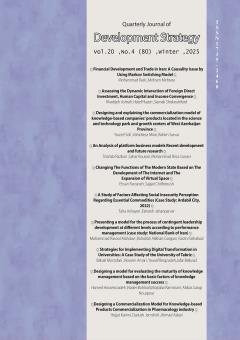Changing The Functions of The Modern State Based on The Development of The Internet and The Expansion of Virtual Space
Subject Areas :
Ehsan Farzaneh
1
*
,
sajjad Chitforoush
2
![]()
1 - Political Science, Faculty of Law and Political Science, University of Tehran, Tehran, Iran.
2 - Assistant Professor of History of the Islamic Revolution, Imam Hossein University, Tehran, Iran
Keywords: Keywords: CyberSpace, Modern State, Neoliberalism, Virtual State, Soft Power.,
Abstract :
Ehsan Farzaneh Sajjad Chitforoush Abstract According to the critical theory of technology, the political system has a close relationship with scientific advances and technological innovations and the resulting social changes. Therefore, the Sate cannot be independent of the ever-increasing development of Internet technology, which is an era-making phenomenon and has affected the social system at all levels. If in a general classification, the functions of the State can be separated into four political, executive, economic and security sections, All these have been affected by the expansion of virtual space. The main question of this article is how the political, executive, economic and security functions of the modern state have changed as a result of the expansion of cyberspace. Critical theory of technology has been used to answer this question. In this framework, it has been explained that the virtual space has changed the functions of the modern state in different layers and these developments are related to the principles and requirements of late capitalism in its neoliberal form.
- افضلی، رسول (ویراستار) (1386)، دولت مدرن در ایران، قم: انتشارات دانشگاه مفید.
- ایگلتون، تری (1400)، بعد از نظریه، ترجمهی اشکان صالحی، تهران: لاهیتا.
- جول، جیمز (1388)،گرامشی، ترجمهی محمدرضا زمردی، تهران: نشر ثالث.
- حافظ نیا، محمدرضا (1390)، جغرافیای سیاسی فضای مجازی، تهران: سمت.
- خائفی، منصوره (1399)، نئولیبرالیسم، صنعت و فناوری ، تهران: آگاه.
- خدایی فتح آبادی، مهرناز (1396)، شناسایی و اولویت بندی عوامل مؤثر بر موقعیت استارت آپهای اکوسیستم کارآفرینی ایران، پایان نامهی کاشناسی ارشد، دانشکدهی مدیریت دانشگاه خوارزمی.
- دستجردی، حسن کامران و زهرا میرمحمدی (1393)، «فضای سایبری و تعاریف جدید در جغرافیای سیاسی»، فصلنامهی انجمن جغرافیایی ایران، سال دوازدهم، شمارهی چهل و سوم.
- رضایی، مهدی و اسماعیل یعقوبی (1394)، «دولت الکترونیک: الگوی جدید در اصلاح نظام اداری و ارائهی خدمات عمومی»، فصلنامهی مدیریت شهری، شمارهی چهل و یکم.
- سیف زاده، سید حسین (1382)، ایران، جهانی شدن سیاست و ظهور دولت مجازی، تهران: موسسهی فرهنگی اندیشه و هنر.
- صدیق، میرابراهیم (1395)، «انقلاب سایبری و تحوّل در پدیدهی جاسوسی»، فصلنامهی مطالعات راهبردی، دورهی نوزدهم، شمارهی اول.
- عاملی، سعیدرضا (1389)، مطالعات انتقادی استعمار مجازی آمریکا: قدرت نرم و امپراطوریهای مجازی، تهران: امیرکبیر.
- فیروزآبادی، ابوالحسن (1399)، درآمدی بر حکمرانی فضای مجازی، تهران: انتشارات دانشگاه امام صادق (ع).
- قنبرلو، عبدالله (1390)، «الگوهای قدرت نرم در خاورمیانه»، دو فصلنامهی مطالعات قدرت نرم، سال اول، شمارهی اول.
- کاستلز، مانوئل (1380)، عصر اطلاعات: اقتصاد، جامعه و فرهنگ، جلد اول: ظهور جامعهی شبکهای، ترجمهی افشین خاکباز و حسن چاوشیان و احد علیقلیان. تهران: طرح نو.
- کاستلز، مانوئل (1380)، عصر اطلاعات: اقتصاد، جامعه و فرهنگ، جلد دوم: قدرت هویت، ترجمهی افشین خاکباز و حسن چاوشیان و احد علیقلیان. تهران: طرح نو.
- کاستلز، مانوئل (1380)، عصر اطلاعات: اقتصاد، جامعه و فرهنگ، جلد سوم: پایان هزاره، ترجمهی افشین خاکباز و حسن چاوشیان و احد علیقلیان، تهران: طرح نو.
- کلارک، یان (1386)، جهانی شدن و نظریهی روابط بینالملل، ترجمهی فرامرز تقی لو، تهران: انتشارات وزارت امور خارجه.
- معتمد نژاد، رضا (1383)، وسایل ارتباط جمعی، تهران: انتشارات دانشگاه علامه طباطبایی.
- نای، جوزف (1392)، آیندهی قدرت، ترجمهی احمد عزیزی، تهران: نی.
- هایدگر، مارتین (1375)، پرسشی در باب تکنولوژی، ترجمهی محمدرضا اسدی، تهران: مؤسسه فرهنگی دانش و اندیشه معاصر.
- Arriaga, P (1985),"Toward a Critique of the Information Economy", Media, Culture & Society, Vol 7, Iss 3.
- Braff, A.T (2005), "Defining Spyware: Necessary or Dangerous", Washington Journal of Law, Technology & Arts, Vol 2, Iss 1.
- Carey, J (1992), Communication as Culture: Essays on Media and Society, Routledge.
- Carnoy, M (1984), The State and Political Theory, Princeton University Press.
- Feenberg, A (1991), Critical Theory of Thechnology, Oxford University press.
- Feenberg, A (2009),Critical Theory of Technology, In J.K.B, Olsen; S.A, Pederson & V.F, Hendricks (eds), Companion to the Philisophy of Technology, Blackwell Publishing Ltd.
- Femia, J (1987), Gramsci's Political Thought. Clarendon.
- Gisbon, W (1984), Neuromancer, Ace Books.
- Green, J. A (2015), Cyber Warfare A Multidisciplinary Analysis, Routledge.
- Hanfer, k & J, Markoff (1992), CYBERPUNK: Outlaws and Hackers on the Computer Frontier, Touchstone.
- Heeks, R (1999), Reinventing Government in the Information Age; International Practice in IT-Enabled Public Sector Reform, Routledge.
- Hossain, M & M.F, Rahman (2018), "Social media and the creation of entrepreneurial opportunity for women", Management, Vol 8, No 4.
- Hughes, O et al (2003),"E-Government in Austrlia and Spain", Working Paper, No 31.
- Mercieca, P (2020), "Social media and entrepreneurship research: A literature review", International Journal of Information Management, Vol 50.
- Moon, M.J (2002), "The Evolution of E-Government Amog Municipalities-Retoric or Reality?", Public Administration Review, Vol 62, No 4.
- Negroponte, N (1995), Being Digital, Vintage Books.
- Nye, J (2004), "Soft Power and American Foreign Policy", Political Science Quarterly, Vol 119, No 2.
- Oberdiek, H (1990),Technology:Autonomous or Nneutral, International Studies in Philosophy of Science, Vol 4, No 1.
- OECD (2003), The case of e-government; Excerpts from the OECD Report the e-government Imperative, OECD Journal on Budgeting.
- Rosecrance, R (1996), The Rise of the Virtual State: Territory Becomes Passe, "Foreign Affairs", Vol 75, No 4

